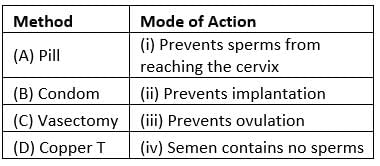Test: Population Explosion & Birth Control - NEET MCQ
10 Questions MCQ Test - Test: Population Explosion & Birth Control
Given below are four methods (A-D) and their modes of action (i) – (iv) in achieving contraception. Select their correct matching from the four options which follow.


Periodic abstinence is a natural method of contraception where the couples avoid or abstain from coitus during the period of the menstrual cycle when:
Assertion (A): Women are at the peak of conception on the 14th day of ovulation.
Reason (R): Vasectomy is a method normally employed to avoid conception in females.
Diaphragms are contraceptive devices used by females. Choose the correct option from the statements given below:
(i) They are introduced into the uterus.
(ii) They are placed to cover the cervical region.
(iii) They act as physical barriers for sperm entry.
(iv) They act as spermicidal agents.
Statement I: Oral contraceptive pills are a safeguard against AIDS and sexual diseases besides checking pregnancy.
Statement II: Copper-T is a physical barrier preventing the body fluid of two partners to come in contact.
Which one of the following is the most widely accepted method of contraception in India at present?
Which of the following birth control measures can be considered as the safest?



















